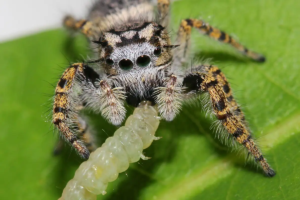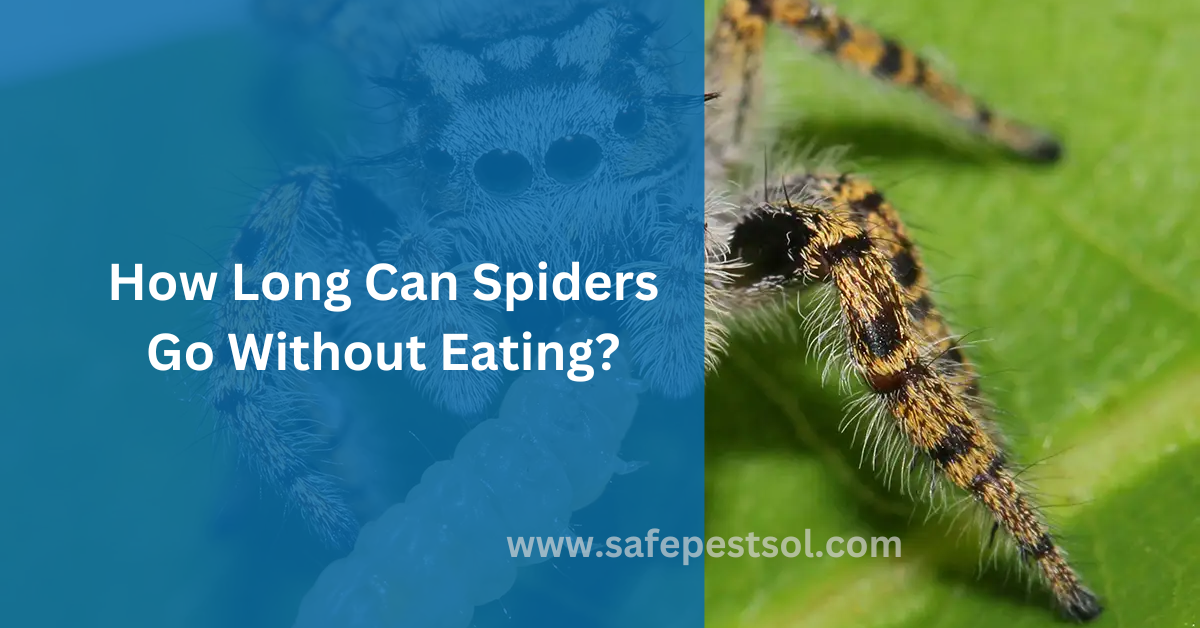How Long Can Spiders Go Without Eating?
Spiders are exciting creatures with different survival techniques that allow them to live without food for a very long time. Whether indoors or outdoors, spiders have some of the most impressive survival skills that help them to live in tough situations without food.
In this blog, you will learn how long spiders can go without food, their diet, and their survival instincts. We will also help you understand their survival span without food by learning about different spider species, including web-building spiders, wolf spiders, and black widow spiders.

Understanding the Eating Habit of Different Spider Species
Spiders come in different varieties and sizes and have specific, unique features. Here’s a short list of the common types of spiders and how often they eat:
| Spider Species | Typical Food Intake Frequency | Adaptation |
| Wolf Spider | 1-2 times a week | Strong hunters, ambush predators |
| Black Widow Spider | 1-2 times a week | Hunts insect prey using webs |
| Tarantulas | Every 2 weeks | Slower metabolism stores nutrients |
| Jumping Spider | Daily | High-energy hunters with solid legs |
| House Spiders | Weekly | Catches pests like flies in webs |
| Recluse Spider | Weekly or less | Can survive significant periods without food |
This knowledge will help us understand how long different kinds of spiders survive. Most spiders are opportunistic eaters, meaning they will eat whatever prey is available to hunt.
How Long Can a Spider Live Without Eating Food
Spiders’ longer life without eating food depends on their species, age, or metabolic activity. Almost all varieties of spiders can survive quite well without consuming food for several weeks to even months.
For example, tarantulas or black widow spiders have metabolic rates that help them carry nutrients for a long time, which allows them to survive without food. On the other hand, baby spiders need to eat often if they want to survive for longer.
Low-metabolic spiders can survive for a longer period without food. This happens because they have a strong metabolism, which helps them store food in their stomachs for later use.
Based on strict store nutrients and highly minimalized food requirements, some species, like tarantulas, can survive up to two years without eating. Large spiders, like water spiders, even last long in certain regions without vast food availability.
How Long a Spider Can Survive Without Eating at Home
Traditionally, house spiders find all the food they need within houses, such as minor insects, flies, or any other pest that can easily be found in homes. With time, house spiders can live inside for weeks or months without food.
Many house spiders conserve energy because they have lower metabolic rates, typically in the colder months. In general, indoor settings are mostly ideal because a spider has a constant source of water, minimal threat of predators, and, most importantly, they can use webs to catch infrequent bugs.
For example, if the house spider runs out of food for two weeks, it will go dormant. This means that it can survive on remaining energy until circumstances change and it finds food again. Other environmental factors, such as moisture and temperatures, affect how long it might survive without food.
How Long a Spider Can Survive Without Eating Outdoors
In outdoor environments, web-building arachnids and land spiders often have access to more food sources. However, prey availability can fluctuate significantly due to environmental conditions, affecting how long they can go without eating.
If necessary, spiders can last several weeks or even months outdoors without food, relying on metabolic adaptations like reduced energy expenditure.
Outdoor conditions are usually much more suitable for web-weaving arachnids and land spiders since they can easily find food sources there. However, the level of prey varies depending on the environmental conditions.
It can take weeks or months outside for a spider to have anything to eat, primarily relying on metabolic adaptations like lessened energy consumption.
Factors That Influence the Diet of a Spider
Below are some factors which highly impact the diet of the spiders:
- Species and Size: Spiders have different food demands based on their size. Tarantulas, the bigger spiders, require fewer feeding frequencies, whereas the smaller species should be fed more often.
- Metabolism: Low metabolic spiders can survive with little nutrition for a more extended period without frequent intake of meals.
- Environmental Conditions: Spiders, mostly found outdoors, face prey shortages that change according to the season. This means they must adapt their habitat, which can impact their eating requirements.
These factors will help you understand spiders’ adaptability and life cycles. In recent years, spiders have found ways to live and thrive in any urban or wild environment.
What Happens if Spiders Don’t Eat for Too Long?
When a spider does not eat for too long, the following things can happen:
- Reduced Activity: A spider decreases activity to conserve energy. Most spiders enter a stage of hibernation as their metabolism drops significantly.
- Increased Vulnerability: Not eating for too long can make spiders weak.
In extreme starvation cases, a spider may die from dehydration or excessive tiredness because the body cannot work independently without proper food input.
Conclusion
Spiders are a highly adaptive species because they can survive for a long time without food due to metabolic solid adaptations and survival tactics. Irrespective of whether they live indoors or outdoors, spiders manage to alter their energy consumption.
Some species, such as the tarantulas and the black widow, are highly resilient. Although they can survive without eating for weeks or months, they still need water to prevent dehydration.
So, in a nutshell, the answer to “How Long Can Spiders Go Without Eating?” depends on the species, environmental factors, and the resilience of the spider.
FAQs
Q1: How Long Can House Spiders Survive Without Food Indoors?
House spiders can survive for several weeks or months without food, depending on conditions and available water sources. Their slow metabolism allows them to stretch the time between meals in favorable indoor settings.
Q2: Do Spiders Need Water to Survive if They Aren’t Eating?
Yes, water is essential for spiders to avoid dehydration. Even if spiders go without food, they require water to survive, especially in dry environments, where it helps them endure extended periods of hunger.
Q3: How Long Can Tarantulas Go Without Food?
Tarantulas are among the most resilient spiders. They can go months or even up to two years without a meal, relying on stored nutrients and naturally low metabolism.
Get Help From Professionals!
Dealing with a spider can be tricky and dangerous. In this situation, it is essential to get help from professionals. So, contact us today, and let us help you get rid of such situations.

